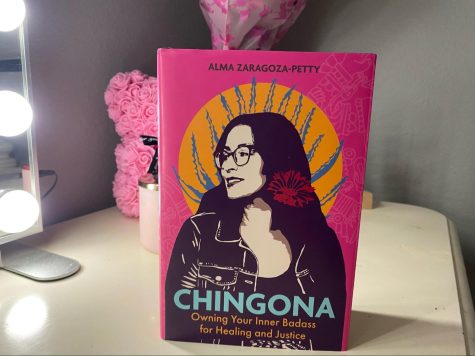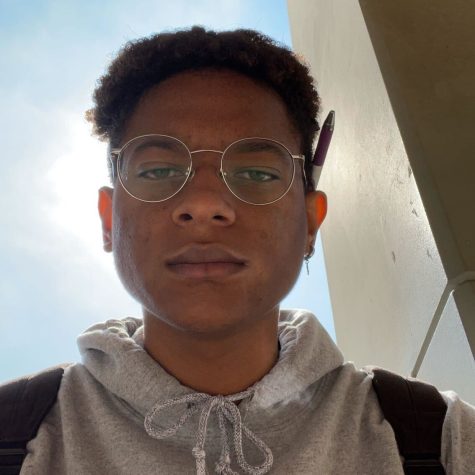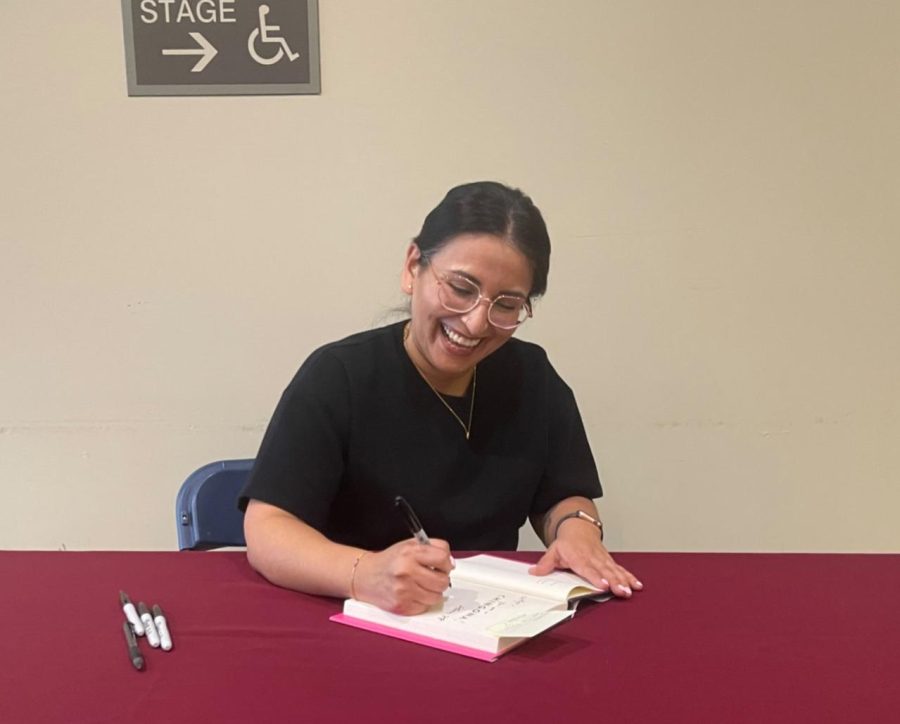Student Equity Speaker Series: Dr. Alma Zaragoza-Petty
“For all the chingonas the world has tried — and failed — to conquer”
Dr. Alma Zaragoza-Petty signing a book during the event.
Dr. Alma Zaragoza-Petty is a Mexicana social justice advocate and scholar who uses equity to educate. Zaragoza-Petty, Dr. ZP or just Alma, has attained a master’s degree in counseling, a doctorate in education and has taught higher education for more than 20 years.
On March 22, during a book signing event for her book “Chingona” on campus, she told her own beautiful story of pursuing a sense of identity and the emotional work needed to heal oneself.

She grew up in the rain-soaked beauty of Acapulco, a city and major seaport on the Pacific coast of Mexico, in her grandparent’s toxic machismo household. During the rainy days where soil turns into mud, a little girl recalls her favorite childhood moments of green frogs that would crawl and shimmer in the sunlight around her brown legs.
Before understanding the definition of a sweatshop, she spent a lot of time with her parents at a clothing factory where she would fascinate herself with a sewing machine, zippers, buttons or clothing tags.
Before her understanding of Immigration and Customs Enforcement or “la migra,” she had seen dozens of workers suddenly pack all of their belongings and forfeit their day’s wages.
When her family moved to Huntington Park, California, as immigrants in the ‘80s she would find the same clothes her parents and their coworkers made in high-end fashion stores. At the root of the store and within herself, she saw the misuse and abuse of people of color and women communities, and sought to inspire change.
Zaragoza-Petty wrote “Chingona” after exploring the etymology of the word and its deeper violent meanings during the pandemic.
She takes the word “chingona,” a historically derogatory or vulgar term for a “difficult” or “aggressive” woman and has repurposed the definition to display confidence, self-worth and the benefit of being fearlessly authentic.
“The modern abbreviated translation. A badass woman,” Zaragoza-Petty said.
The male version “un chingon” is worn as a badge of honor amongst men within Latino culture as the good kind of badass: a guy worthy of respect. But for women — especially in households like Zaragoza-Petty’s grandparents — to be called “chingona” means that you are acting like a parentless child. Specifically, a fatherless child.
“’Chingona’ was used to keep good little Latina girls doing good little Latina girl things,” she said in her book.
“’Chingona’ was the last thing you wanted to be called as a young girl,” Zaragoza-Petty said to attendees during the signing. “The same word used to elevate power in men is used to take power from women.”
In truth, the history behind “chingar” and other similar words have colonial and patriarchal roots. The first people referred to as “hijos de la chingada” are from when Spanish colonizers had raped Indigenous women and children were born as of result. “Hijos de la chigada” translated to “children of the fuck” or “sons of the raped woman.”
In her book, Zaragoza-Petty told the story of La Malinche, the original “chingada.”
La Malinche worked along Spanish conquistador Hernan Cortes as a translator. She was highly valuable to the Spaniards because she could understand the two major languages of the region, Maya-Yucateca and Nahuatl. Even though La Malinche was sold by her own people to Cortes as a slave, she was labeled a traitor throughout history and she never was able to tell her own story.
“Understanding La Malinche in a more complicated and real way can help us learn about the work it takes to reclaim our own voices of power,” Zaragoza-Petty said. “Because like La Malinche, ‘chingonas’ survive unspeakable harm and trauma. But unlike her, we actually have the option to tell our truth and reclaim our power.”
And yes, she said, “Anybody can be a ‘chingona.’”
During her teen years in the Los Angeles area, Zaragoza-Petty would use an endless amount of books at the library to escape. Not only into different worlds, but also away from her own. Her mother didn’t want to receive a dreaded late fee from a checked out book getting lost, so teenaged Alma would sit for hours on end in the library to read and remember her rainy frog days.
“One of the things that I didn’t understand was how coming here was a good thing for us because I used to live in a paradise,” Zaragoza-Petty said. “Yeah, sure we had dirt floors and people might have called us poor or impoverished — I didn’t feel that way. It was beautiful, it was a lush tropical garden.”
Over the next years of her life, Zaragoza-Petty is taking the pain from past trauma and using it within her personal healing process. Using past experience as a stepping stone for change is the epitome of her message. In her book, she goes in depth about her healing process, the idea of Nepantla or “ni aqui ni alla,” meaning “neither here nor there,” the importance of community and the emphasis that each individual’s story is necessary for evolutionary change.
Zaragoza-Petty engaged with attendees by dampening the harsh reality with occasional humor of her past experiences. After a small Q&A, Zaragoza-Petty signed copies of her book that were handed out at the event.
The Student Equity Speaker Series continues to feature authors and their creations on campus. Look out for announcements posted all around campus or check online for updates on new information.
“We have to contend with the additional layer that the suffering of our [ancestors] left a metaphysical scar on our souls. Also too that somehow through their resistance and fight for survival, we are not only here, but a force to be reckoned with. The emotional, mostly invisible work we must do to heal ourselves as we also pursue belonging in our college paths, in our professions and in parenthood. The responsibility we have to each other and future generations to grow, heal and lead others in that process.” – Dr. Alma Zaragoza-Petty



